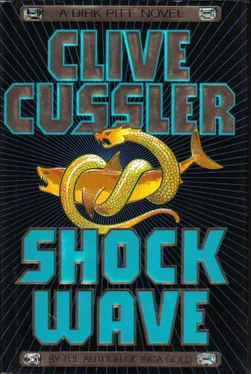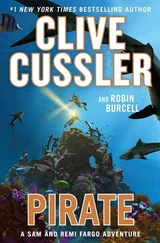Clive Cussler - Shock Wave
Здесь есть возможность читать онлайн «Clive Cussler - Shock Wave» весь текст электронной книги совершенно бесплатно (целиком полную версию без сокращений). В некоторых случаях можно слушать аудио, скачать через торрент в формате fb2 и присутствует краткое содержание. Год выпуска: 1996, ISBN: 1996, Издательство: Simon & Schuster, Жанр: Детектив, на английском языке. Описание произведения, (предисловие) а так же отзывы посетителей доступны на портале библиотеки ЛибКат.
- Название:Shock Wave
- Автор:
- Издательство:Simon & Schuster
- Жанр:
- Год:1996
- ISBN:978-0684802978
- Рейтинг книги:5 / 5. Голосов: 1
-
Избранное:Добавить в избранное
- Отзывы:
-
Ваша оценка:
- 100
- 1
- 2
- 3
- 4
- 5
Shock Wave: краткое содержание, описание и аннотация
Предлагаем к чтению аннотацию, описание, краткое содержание или предисловие (зависит от того, что написал сам автор книги «Shock Wave»). Если вы не нашли необходимую информацию о книге — напишите в комментариях, мы постараемся отыскать её.
Shock Wave — читать онлайн бесплатно полную книгу (весь текст) целиком
Ниже представлен текст книги, разбитый по страницам. Система сохранения места последней прочитанной страницы, позволяет с удобством читать онлайн бесплатно книгу «Shock Wave», без необходимости каждый раз заново искать на чём Вы остановились. Поставьте закладку, и сможете в любой момент перейти на страницу, на которой закончили чтение.
Интервал:
Закладка:
“Yes, yes, and the Cold War’s been over for ten years. I know all that.”
“For what it’s worth,” said Rudolph, “I read the pilot as scared out of his wits. I detect no indication of threat in his tone.”
Briscoe sat silent for a few moments, then flicked a switch on the ship’s intercom. “Radar, are your ears up?”
“Yes, sir,” a voice answered. “Any ships in the area?”
“I read one large vessel and four smaller ones, bearing two-seven-two degrees, distance ninety-five kilometers.”
Briscoe broke off and pressed another switch. “Communications?”
“Sir?”
“See if you can raise a fleet of Russian whaling ships ninety-five kilometers due west of us. If you need an interpreter, the ship’s doc can translate.”
“My thirty-word Russian vocabulary should get me by,” the communications officer answered cheerfully.
Briscoe looked at Rudolph. “All right, tell him permission is granted to set down on our landing pad.”
Rudolph passed on the word, and they all watched as the helicopter angled in from the starboard beam and began a shallow power-glide approach over the landing pad just forward of the stern in readiness for a hovering descent.
To Briscoe’s practiced eyes, the pilot was handling the aircraft erratically, failing to compensate for the brisk wind. “That idiot flies like he’s got a nervous disorder,” snapped Briscoe. He turned to Angus. “Reduce speed and order an armed reception committee to greet our visitor.” Then as an afterthought. “If he so much as scratches my ship, shoot him.”
Angus grinned amiably and winked at Rudolph behind the captain’s back as he ordered the helmsman at the ship’s console to reduce speed. There was no insubordination intended in their shared humor. Briscoe was admired by every man of the crew as a gruff old sea dog who watched over his men and ran a smooth ship. They were wet) aware that few ships in the Royal Navy had a captain who preferred sea duty to promotion to flag rank.
The visitor was a smaller version of the Ka-32 Helix Russian Navy helicopter, which was used for light transport duty and air reconnaissance. This one, used by a fishing fleet for locating whales, looked badly in need of maintenance. Oil streaked from the engine cowlings and the paint on the fuselage was badly chipped and faded.
The British seamen waiting under the protection of steel bulkheads cringed as the helicopter flared out barely three meters above the pitching deck. The pilot sharply decreased his engine rpms too early, and the craft dropped heavily to the deck, bounced drunkenly back into the air and then smacked down hard on its wheels before finally settling like a chastised collie into motionless submission. The pilot shut down his engines, and the rotor blades swung to a stop.
The pilot slid open an entry door and stared up at the Bridlington’s huge radar dome before turning his eyes to the five advancing seamen, automatic weapons firmly clutched in their hands. He jumped down to the deck and peered at them curiously before he was taken roughly by the arms and hustled through an open hatch. The seamen escorted him up three decks through a wide companionway before turning into a passageway that led to the officers’ wardroom.
The ship’s first officer, Lieutenant Commander Roger Avondale, had joined the reception committee and stood off to one side with Lieutenant Angus. Surgeon Lieutenant Rudolph waited at Briscoe’s elbow to interpret. He studied the Russian pilot’s eyes and read terror numbed by fatigue in the wide pupils.
Briscoe nodded at Rudolph. “Ask him what in hell made him assume he can board a foreign naval vessel any time he chooses.”
“You might also inquire as to why he was flying alone,” added Avondale. “Not likely he’d scout for whales by himself.”
Rudolph and the pilot began a rapid-fire exchange that lasted for a solid three minutes. Finally the ship’s doctor turned and said, “His name is Fyodor Gorimykin. He is chief pilot in command of locating whales for a whaling fleet from the port of Nikolayevsk. According to his story, he and his copilot and an observer were out scouting for the catcher ships—”
“Catcher ships?” inquired Angus.
“Swift-moving vessels about sixty-five meters in length that shoot explosive harpoons into unsuspecting whales,” explained Briscoe. “The whale’s body is then inflated with air to keep it afloat, marked with a radio beacon that sends out homing signals and left while the catcher continues its killing spree. Later, it returns to its catch and tows it back to the factory ship.”
“I had drinks with a captain of a factory ship in Odessa a few years ago,” said Avondale. “He invited me aboard. It was an enormous vessel, nearly two hundred meters in length, totally self-sufficient, with high-tech processing equipment, laboratories and even a well-staffed hospital. They can winch a hundred-ton blue whale up a ramp, strip the blubber like you’d peel a banana and cook it in a rotating drum. The oil is extracted and everything else is ground and bagged as fish— or bonemeal. The whole process takes little more than half an hour.”
“After being hunted to near extinction, it’s a wonder there are any whales left to catch,” muttered Angus.
“Let’s hear the man’s story,” Briscoe demanded impatiently.
“Failing to locate a herd,” Rudolph continued, “he returned to his factory ship, the Aleksandr Gorchakov. After landing, he swears they found the entire crew of the vessel, as well as the crews on the nearby catcher ships, dead.”
“And his copilot and observer?” Briscoe persisted.
“He says he panicked and took off without them.”
“Where did he intend to go?”
Rudolph questioned the Russian and waited for the answer to pour out. “Only as far away from the mass death t as his fuel would take him.”
“Ask him what killed his shipmates.”
After an exchange, Rudolph shrugged. “He doesn’t know. All he knows is that they had expressions of agony on their faces and appeared to have died in their own vomit.”
“A fantastic tale, to say the least,” observed Avondale.
“If he didn’t look as if he’d seen a graveyard full of ghosts,” said Briscoe, “I’d think the man was a pathological liar.”
Avondale looked at the captain. “Shall we take him at his word, sir?”
Briscoe thought for a moment, then nodded. “Lay on another ten knots, then signal Pacific Fleet Command. Apprise them of the situation and inform them we are altering course to investigate.”
Before action could be taken, a familiar voice came over the bridge speaker system. “Bridge, this is radar.”
“Go ahead, radar,” acknowledged Briscoe.
“Captain, those ships you ordered us to track.”
“Yes, what about them?”
“Well, sir, they’re not moving, but they’re beginning to disappear off the scope.”
“Is your equipment functioning properly?”
“Yes, sir, it is.”
Briscoe’s face clouded in bafflement. “Explain what you mean by ‘disappearing.’”
“Just that, sir,” answered radar officer. “It looks to me as if those ships out there are sinking.”
The Bridlington arrived at the Russian fishing fleet’s last known position and found no ships floating on the surface. Briscoe ordered a search pattern, and after steaming back and forth a large oil slick was spotted, surrounded by a widely scattered sea of flotsam, some of it in localized clusters. The Russian helicopter pilot rushed to a deck railing, gestured at an object in the water and began crying out in anguish.
“Why is he babbling?” Avondale shouted to Rudolph from the bridge wing.
“He’s saying his ship is gone, all his friends are gone, his copilot and observer are gone.”
Читать дальшеИнтервал:
Закладка:
Похожие книги на «Shock Wave»
Представляем Вашему вниманию похожие книги на «Shock Wave» списком для выбора. Мы отобрали схожую по названию и смыслу литературу в надежде предоставить читателям больше вариантов отыскать новые, интересные, ещё непрочитанные произведения.
Обсуждение, отзывы о книге «Shock Wave» и просто собственные мнения читателей. Оставьте ваши комментарии, напишите, что Вы думаете о произведении, его смысле или главных героях. Укажите что конкретно понравилось, а что нет, и почему Вы так считаете.












